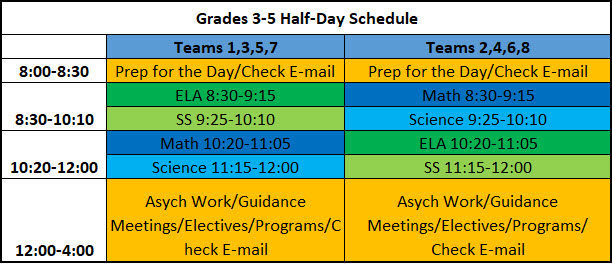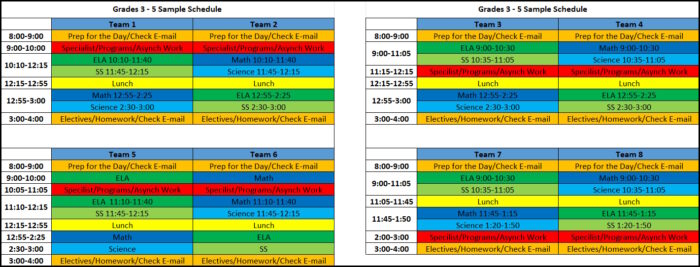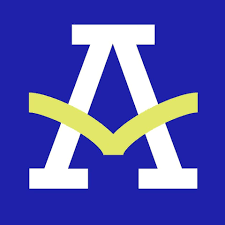ELEMENTARY SCHOOL
The elementary program is grounded in the belief that all students can thrive in a cyber environment through a solid partnership between parents/learning coaches and staff. In each grade level, students will be exposed to four core content classes: Math, History, Science, and English Language Arts.
Students also will have the opportunity to participate in small group instruction and the following electives: Art, STEELS (a live class in 3rd – 5th grade), Keyboarding, Health/PE and Music. Small group instruction is designed to meet the needs of each of our learners. Student will work with teachers to strengthen or refine skills during Focus Time (K-2) or the intervention block (3-5). In grades Kindergarten-2, students will be with one teacher for each core subject. However, in grades 3-5, students will work with a team of teachers who each teach a specific core subject.
Agora staff will maintain contact and build relationships with students and families via telephone, live online sessions, face-to-face experiences, conferences, and during standardized testing participation.
If you have an objection to specific academic course, content, a resource, an instructional practice or assessment, please follow the procedure detailed:
Meet Our Elementary School Staff

Jansen Hornbake

Kristie Hawk

James Montgomery

Jennifer Fisher-Clark

Michelle Cukauskas

Maryann Johnson
Elementary School Assessment Plan
|
|||||
| Assessment: | Intended For: | Type: | Description: | Purpose Use: | Administered: |
| Kindergarten
Screening (using Core Phonics and Aimsweb Plus) |
Incoming Kindergarten Students | Diagnostic/ Screening | This assessment, using vendor-supplied instruments, is designed to capture incoming students’ readiness for formal Education. | Assessment of incoming students’ cognitive and developmental skills and knowledge of foundational elements of literacy and numeracy. Used to inform teachers’ decision-making regarding curriculum and instruction. | August 30 – September 6, 2021 |
| Reading Plus | Grades 3-5 | Diagnostic | Adaptive literacy intervention focusing on fluency, comprehension, and motivation. | Frequent assessment and monitoring of students to drive instruction andinterventions. Teachers are notified when students require support or intervention and are provided with the resources for face-to face instruction.
|
No Later than September 13, 2021
|
| Constructed Response
Math |
Grades 3-5 | Formative | Constructed-response questions are assessment items that ask students to apply knowledge, skills, and critical thinking abilities to real-world, standards-driven performance tasks. | The purpose of the Constructed Response assessment is to improve student writing and analysis of text. This will be a benchmark assessment to predict how students will perform on the PSSAs and will also be an instructional tool which teachers can use to inform instructional decisions. This will also help build students’ writing stamina. |
Nov 1st 2021 Jan 14th 2022 Mar 18th 2022 May 25th 2022
|
| Constructed Response
ELA |
Grades 3-5 | Formative | Constructed-response questions are assessment items that ask students to apply knowledge, skills, and critical thinking abilities to real-world, standards-driven performance tasks. | The purpose of the Constructed Response assessment is to improve student writing and analysis of text. This will be a benchmark assessment to predict how students will perform on the PSSAs and will also be an instructional tool which teachers can use to inform instructional decisions. This will also help build students’ writing stamina. | Nov 1st 2021
Jan 14th 2022 Mar 18th 2022 May 25th 2022 |
| TDA Benchmark
ELA |
Grades 3-5 | Formative | Text Dependent Analysis and Text Dependent Questions ask questions that force students to synthesize answers based on specific evidence within a reading passage and demonstrate their ability to interpret the meaning behind that evidence. | The purpose of the TDA assessment is to improve student writing and analysis of text. This will be a benchmark assessment to predict how students will perform on the PSSAs and will also be an instructional tool which teachers can use to inform instructional decisions. This will also help build students’ writing stamina. | Nov 1st 2021
Jan 14th 2022 Mar 18th 2022 May 25th 2022 |
| TDA Benchmark
Science |
Grades 3-5 | Formative | Text Dependent Analysis and Text Dependent Questions ask questions that force students to synthesize answers based on specific evidence within a reading passage and demonstrate their ability to interpret the meaning behind that evidence. | The purpose of the TDA assessment is to improve student writing and analysis of text. This will be a benchmark assessment to predict how students will perform on the PSSAs and will also be an instructional tool which teachers can use to inform instructional decisions. This will also help build students’ writing stamina. | Nov 1st 2021
Jan 14th 2022 Mar 18th 2022 May 25th 2022 |
| TDA Benchmark
Social Studies |
Grades 3-5 | Formative | Text Dependent Analysis and Text Dependent Questions ask questions that force students to synthesize answers based on specific evidence within a reading passage and demonstrate their ability to interpret the meaning behind that evidence. | The purpose of the TDA assessment is to improve student writing and analysis of text. This will be a benchmark assessment to predict how students will perform on the PSSAs and will also be an instructional tool which teachers can use to inform instructional decisions. This will also help build students’ writing stamina. | Nov 1st 2021
Jan 14th 2022 Mar 18th 2022 May 25th 2022 |
| aimswebPlus Reading & Math | Grades K-5
All students; Special education students based on IEP |
Interim/
Benchmark (Progress Monitoring) |
Universal screening and progress monitoring tool used to measure math and reading skills. | To inform instruction for intervention & challenge during core classes and Personal Learning Time (PLT) sessions | Benchmark Window:
August – Sept 3, 2021 January 4-10, 2022 May 9-13, 2022 PM: Once a week/bi weekly |
| Common Unit Assessments | Grades K-5
All students; special education students based on IEP |
Summative, Interim/
Benchmark |
Standards-aligned assessment, benchmarked to determine concepts and skills taught during the unit in for the core content areas: ELA, math, science and social studies. | To assess shared learning across all classes, provide data to inform decisions related to instructional practice, identify areas for differentiated instruction, flexible grouping, possible strategies, and interventions to implement, make necessary modifications to curriculum, and to close gaps in student understandings. | End of Units of Study |
| PSSA
PASA |
Math
Grades 3, 4, and 5 All students; special education students based on IEP ELA Grades 3, 4, and 5 All students; special education students based on IEP Science Grades 4 All students; special education students based on IEP |
Summative | The PSSA is a standards-based, criterion-referenced assessment which provides
students, parents, educators, and citizens with an understanding of student and school performance related to the attainment of proficiency of the academic standards. The Science PSSA is administered to 4th grade students only. |
The PSSA and PASA state assessments can be used to assist teachers in identifying students who may be in need of additional educational opportunities, and school scores provide information to schools and districts for curriculum and instruction improvement discussions and planning. | April 25-May 13 |











 Agora Cyber Charter School
Agora Cyber Charter School